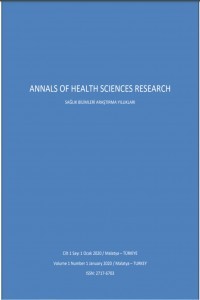46,XX Testiküler Bozukluğu Olan Erkek Hasta: Bir Olgu Sunumu
46, XX, Y kromozom mikrodelesyonu
Male Patient with 46,XX Testicular Disorder: A Case Report
46, XX, Y chromosome microdeletions,
___
- 1. Bekir Uçan, Mustafa Özbek, Oya Topaloğlu, Ahmet Yeşilyurt, Aşkın Güngüneş, Taner Demirci, Tuncay Delibaşı. 46,XX Erkek Sendromu. Turk Jem 2013; 17: 46-8.
- 2. Ahmet Anık, Gönül Çatlı, Ayhan Abacı, Ece Böber. 46,XX Male Disorder of Sexual Development: A Case Report. J Clin Res Pediatr Endocrinol 2013; 5 (4): 258- 60.
- 3. Wu QY, Li N, Li WW, Li TF, Zhang C, Cui YX, Xia XY, Zhai JS. Clinical, molecular and cytogenetic analysis of 46, XX testicular disorder of sex development with SRY-positive. BMC Urol 2014; 14: 70.
- 4. Li TF, Wu QY, Zhang C, Li WW, Zhou Q, Jiang WJ, Cui YX, Xia XY, Shi YC. 46,XX testicular disorder of sexual development with SRY-negative caused by some unidentified mechanisms: a case report and review of the literatüre. BMC Urol 2014; 14: 104.
- 5. Gao X, Chen G, Huang J, Bai Q, Zhao N, Shao M, Jiao L, Wei Y, Chang L, Li D, Yang L. Clinical, cytogenetic, and molecular analysis with 46,XX male sex reversal syndrome: case reports. J Assist Reprod Genet. 2013; 30 (3): 431-5.
- 6. Rajender S, Rajani V, Gupta NJ, Chakravarty B, Singh L, Thangaraj K. SRY-negative 46,XX male with normal genitals, complete masculinization and infertility. Mol Hum Reprod 2006; 12 (5): 341-6.
- 7. Agrawala RK, Choudhury AK, Mohanty BK, Baliarsinha AK. All males do not have 46 xy karyotype: A rare case report. Indian J Endocrinol Metab 2013; 17 (Suppl 1): 271-3.
- 8. Mizuno K, Kojima Y, Kamisawa H, Moritoki Y, Nishio H, Kohri K, Hayashi Y. Gene Expression Profile During Testicular Development in Patients With SRYnegative 46,XX Testicular Disorder of Sex Development. Urology 2013; 82 (6): 1453. e1-7.
- 9. Gruber CJ, Hengstschläger M, Wieser F, Gruber DM, Walch K, Ferlitsch K, Gruber IM, Maar A, Marton E, Bernaschek G, Huber JC. Absence of microdeletions in the azoospermia-factor region of the Y-chromosome in Viennese men seeking assisted reproduction. Wien Klin Wochenschr 2003; 115 (23): 831-4.
- 10. Kim MJ, Choi HW, Park SY, Song IO, Seo JT, Lee HS. Molecular and cytogenetic studies of 101 infertile men with microdeletions of Y chromosome in 1,306 infertile Korean men. J Assist Reprod Genet 2012; 29 (6): 539- 46.
- 11. Zhang YS, Dai RL, Wang RX, Zhang HG, Chen S, Liu RZ. Analysis of Y Chromosome Microdeletion in 1738 Infertile Men From Northeastern China. Urology 2013; 82 (3): 584-8.
- 12. Zhang F, Li L, Wang L, Yang L, Liang Z, Li J, Jin F, Tian Y. Clinical Characteristics and Treatment of Azoospermia and Severe Oligospermia Patients With Y-Chromosome Microdeletions. Mol Reprod Dev 2013; 80 (11): 908-15.
- 13. Mitra A, Dada R, Kumar R, Gupta NP, Kucheria K, Gupta SK. Screening for Y-chromosome microdeletions in infertile Indian males: Utility of simplified multiplex PCR. Indian J Med Res 2008; 127 (2): 124-32.
- 14. Chiang HS, Wu YN, Wu CC, Hwang JL. Cytogenic and molecular analyses of 46,XX male syndrome with clinical comparison to other groups with testicular azoospermia of genetic origin. J Formos Med Assoc 2013; 112 (2): 72-8.
- 15. Li Z, Haines CJ, Han Y. “Micro-deletions” of the human Y chromosome and their relationship with male infertility. J Genet Genomics 2008; 35 (4): 193-9.
- 16. Babu SR, Sadhnani MD, Swarna M, Padmavathi P, Reddy PP. Evaluation of FSH, LH and testosterone levels in different subgroups of infertile males. Indian J Clin Biochem 2004; 19 (1): 45-9.
- Başlangıç: 2012
- Yayıncı: İnönü Üniversitesi
Engelli Çocuğu Olan Ailelerin Yaşam Kalitesi
Oral Premalign Lezyonların Teşhis Yöntemleri
Fahrettin KALABALİK, Elif Tarım ERTAŞ
46,XX Testiküler Bozukluğu Olan Erkek Hasta: Bir Olgu Sunumu
Elçin Latife KURTOĞLU, Serap SAVACI, Cemal EKİCİ, Emine YAŞAR, Ali BEYTUR, Elif YEŞİLADA
Kronik Hastalığı Olan Çocuğa Sahip Ebeveynlerin Bakım Verme Yükü
Nesrin Ağkaya ALAHAN, Rukuye AYLAZ, Gülsüm YETİŞ
Elastomerik Ölçü Materyalleri Dezenfeksiyonu ve Raf Ömrü
Mustafa KOCACIKLI, Betül Kökdoğan BOYACI
Genel Cerrahi Hastalarında Ameliyat Sonrası Konstipasyon Riski
Üniversite Öğrencilerinin Stresle Başa Çıkma Tarzlarının Menstrual Düzensizliğe Etkisi
Yeşim AKSOY DERYA, Sermin Timur TAŞHAN, Tuba UÇAR
Cinsel İstismar Mağduru Çocuklarla Çalışan Uzmanların Gözünden Mağdur Çocukların Özellikleri
Zekeriya ÇALIŞKAN, Mehmet SAĞLAM
Nedenleri ve Sonuçlarıyla Doğum Korkusu
Nadir Karşılaşılan Bir Endodontik Problem: Radiks Entomolaris
